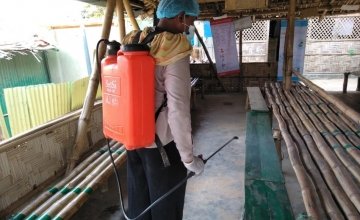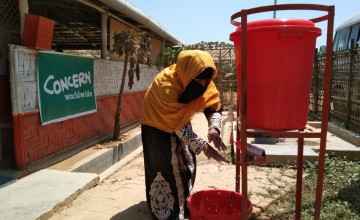
Read our 2023 annual report

Knowledge Hub
High unemployment and COVID hampering monsoon readiness in Bangladesh

Increased levels of unemployment and income loss as a result of the COVID-19 health pandemic are making it harder for vulnerable communities in Bangladesh to prepare for floods and landslides caused by the monsoon rains, according to a new report.
Incomes impacted
In communities surveyed in Bangladesh, the report found 72 per cent to be unemployed due to movement restrictions and workplace closures. Daily wage workers, such as rickshaw and transport drivers, masons, garment workers, small scale traders and farmers, which accounted for nearly half of the surveyed population, have been especially impacted.
The report warns that flood and landslides from this year’s monsoon season will impact communities more severely because of economic stagnation and COVID-19 health risks.
Commissioned by Concern Worldwide, Mercy Corps and Practical Action on behalf of the Zurich Flood Resilience Alliance, “Monsoon, floods and COVID-19: building community resilience in Bangladesh”, surveyed 15 Union Disaster Management Committees – community resilience action committees -- across three districts which are home to 380,000 people.
The committee representatives were interviewed over the phone to understand their readiness for the monsoon rains and flooding season, amid the COVID-19 health crisis.
Main findings
The report found:
- 72 per cent of the population to be unemployed due to movement restrictions and workplace closures;
- Lack of income, increase in prices of goods and market closures are leading to challenges to purchase food and essential items for hygiene and sanitation maintenance such as soap;
- Cultivation of agriculture products is difficult due to lack of seeds, fertilizers, and pesticides in the market;
- Fears of the monsoon-induced floods exacerbating socio-economic and health conditions of vulnerable groups and pushing people into poverty;
- Nearly 90% of people are not fully aware of proper hygiene and sanitation practices to prevent COVID-19 transmission, especially during flood events;
- Without quarantine facilities, home isolation is the only available option for those suspected of having COVID;
- 75 per cent of management committees are not fully functional, mainly due to lack of resources in personnel and budget;
- Most committees have not been able to consider COVID-19 in disaster management plans due to lack of knowledge and guidance on how to do so, including on distancing and transmission prevention means in an evacuation scenario.

The report’s co-author, Zakia Naznin, Programme Manager, Flood Resilience Project, Char Programme, from Concern Worldwide said: “While it is not possible to prevent floods and storms, it is possible to limit the damage they cause to vulnerable communities, to help prevent loss of life and livelihoods, damage to property and essential services such as hospitals and schools.”
“We are calling for wealthy countries and donors to help assist the authorities in Bangladesh support the most vulnerable people, as they grapple with the compound risks of floods and storms resulting from the monsoon rains, as well as COVID-19.”
Climate change shocks
Co-author, Afsari Begum, Senior Specialist for Disaster Risk Reduction, from Practical Action in Bangladesh said: “We are concerned that a lot of people will be pushed further into poverty because of COVID-19, but especially if communities are battered by intense storms and floods that destroy or damage homes, agricultural land, schools and hospitals.”
Subinoy Dutta, Programme and Advocacy Manager, Zurich Flood Resilience Alliance, Mercy Corps in Bangladesh said: “Bangladesh is a country that is very vulnerable to hazards like storms and flood impacts, which are exacerbated by climate change shocks like rising sea levels. Now, at the start of this monsoon season, it has to grapple with the COVID-19 crisis. Our research shows that a lot of people, especially the poor, are unable to earn income in sectors that require them to leave the house to make a living. For them, there is no work from home option.”
For media interviews and further information contact Eamon Timmins, Media Relations Manager, Concern, at eamon.timmins@concern.net or 00 353 87 9880524
Other ways to help
Corporate support
Is your company interested in working together for a common cause?
Fundraise for Concern
From mountain trekking to marathon running, cake sales to table quizzes, there are lots of ways you can support our work.
Buy a gift
With an extensive range of alternative gifts, we have something to suit everybody.
Leave a gift in your will
Leave the world a better place with a life-changing legacy.
Volunteer with Concern
The lots of ways to get involved with our work as a volunteer
School fundraising
Without the generous support from schools, we wouldn't be able to do the work that we do.

